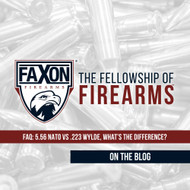FAQ: 5.56 NATO vs .223 Wylde, What's The Difference?
Posted by Faxon Firearms Staff on May 8th 2023
5.56 NATO vs .223 Wylde, What's The Difference?
The 5.56 NATO has been a venerated defensive and tactical cartridge for decades alongside its “civilian” counterpart .223 Remington which has been respected as a small-medium game hunting cartridge and target round. For nearly as long, there has been quite a bit of debate about which chamber is better for an AR-15 rifle.
The .223 Remington chamber is a bit tighter and generally considered more accurate by target shooters and varmint hunters, but this does make it less reliable in semi-automatic firearms and it is not capable of safely firing 5.56 NATO spec ammunition. 5.56 NATO has looser dimensions and a more robust build that makes it exceptionally reliable even with higher pressure mil-spec ammunition, but it does have less accuracy potential than .223 Remington.
Fortunately, an accomplished competition shooter and gunsmith named Bill Wylde developed a chambering that found the sweet spot between the .223 Remington and 5.56 NATO. This is the now popular .223 Wylde chamber.
Faxon Firearms produced both 5.56 NATO chambered barrels and .223 Wylde chambered barrels and we wanted to take a moment to describe the differences between these chambers and go over why you might choose one or the other.
One of the major downsides to a .223 Remington chamber is that it can only safely accept .223 Remington ammunition. This is due to differences in the actual body dimensions of the cartridge and the chamber. The .223 Wylde solves this issue by using the same body dimensions as the 5.56 NATO chamber. This means a .223 Wylde can accept both .223 Remington and 5.56 NATO spec ammunition.
The one feature that the .223 Wylde brings over from the .223 Remington is the diameter and length of the free bore, or the unrifled portion of the barrel between the shoulder for the case mouth and the leade into the rifling. This tighter and shorter free bore leads to higher accuracy potential, especially with heavier match grade loadings, but still has reliable function with both 5.56 and .223 Remington spec ammo. This is also the one potential downside of .223 Wylde, as the tighter dimensions of the throat will be affected by fouling/dirt quicker than the looser dimensioned 5.56 NATO chamber.
So which chamber is best for your build? That will depend on your specific use case for the rifle. If you are looking for a robust chamber that will work with all kinds of ammunition and in all conditions, then you will be best served by a 5.56 NATO chamber. It is still the standard chambering for military rifles around the world for a reason! If you are looking for the best accuracy potential out of a self-loading rifle, then you will look to the .223 Wylde as your answer. The .223 Wylde chamber is preferred by 3-gun competitors and other practical rifle shooting competitors for its high accuracy potential but remaining functional in semi-auto firearms with a wide variety of ammunition.
No matter which chamber you choose to go with, Faxon Firearms has multiple lengths and profiles of both .223 Wylde and 5.56 NATO chambered barrels to suit your build!

